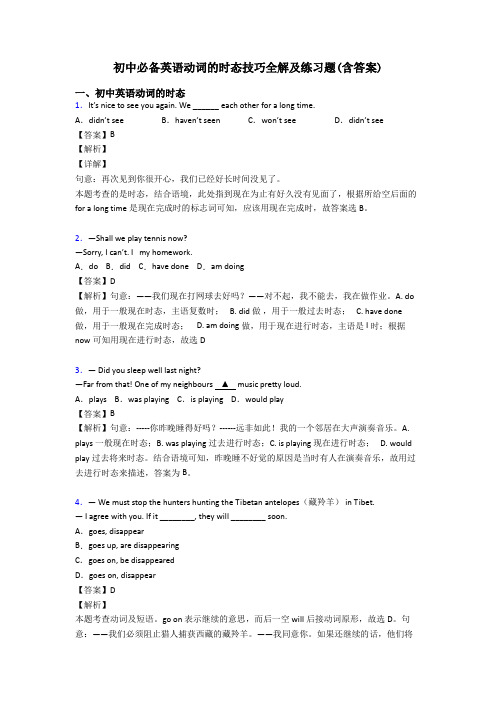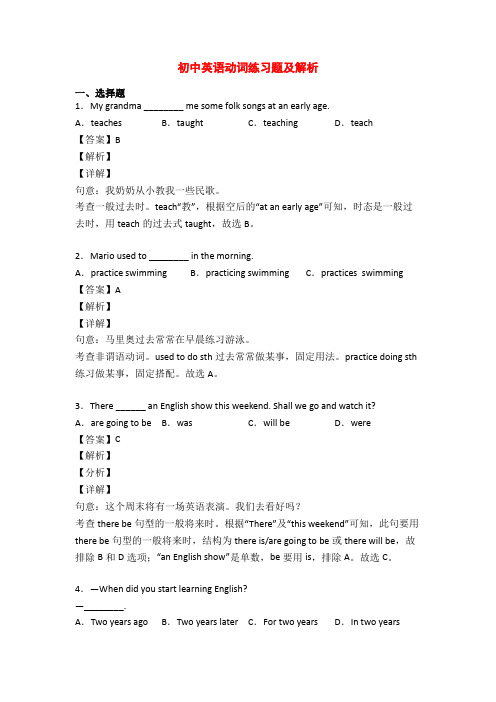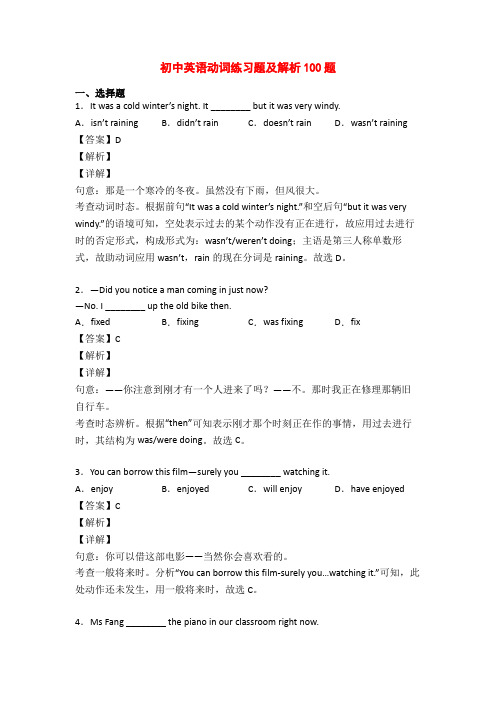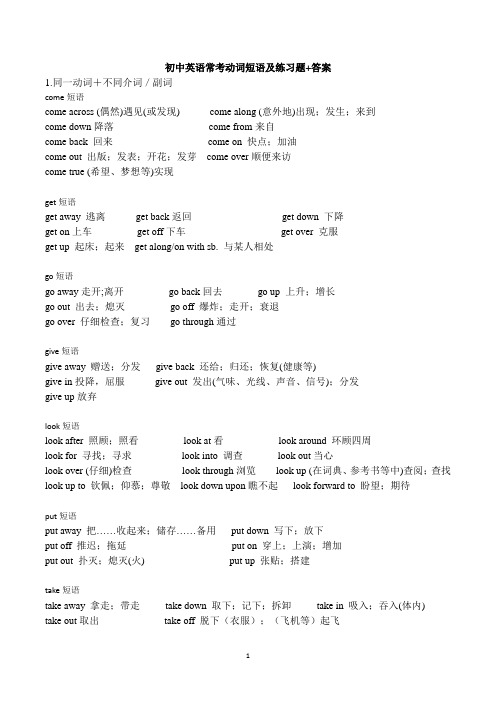初中英语动词讲解与练习
系动词讲解与练习-初中英语

系动词讲解与练习-初中英语(学生)(总3页)--本页仅作为文档封面,使用时请直接删除即可----内页可以根据需求调整合适字体及大小--Linking Verb系动词(Link Verb),它本身有词义,但不能单独用作谓语,不能用进行时态,后边必须跟表语(adj)即:link v + adj,构成系表结构说明主语的状况、性质、特征等情况。
(1)be 动词We are good friends.The earth is as round as a ball.(2)感官系动词: feel, smell, sound,Your idea sounds great.The flowers smell sweet and nice.The pizza made by Lucy tastes delicious.Ice always feels cold to us.(3)变化系动词: become, grow, turn, fall, get, goThe days become longer and longer in summer.Her face turned red when the teacher called her name.The child fell asleep while he doing his homework.Everything will come all right in the end.(4) 表像系动词: seem, appear, look, “看起来、显得”seem/ appear+(to be ) adj/nShe seemed (to be) an honest woman.He seemed (to be) interested in the book .He looked(看起来) angry/ sad/ happy.He appeared (to be) disappointed.(5) 持续系动词:keep, hold, remain, stay, 表示状态、情况等的继续或保持。
初中必备英语动词的时态技巧全解及练习题(含答案)

初中必备英语动词的时态技巧全解及练习题(含答案)一、初中英语动词的时态1.It’s nice to see you again. We ______ each other for a long time.A.didn’t see B.haven’t seen C.won’t see D.didn’t see【答案】B【解析】【详解】句意:再次见到你很开心,我们已经好长时间没见了。
本题考查的是时态,结合语境,此处指到现在为止有好久没有见面了,根据所给空后面的for a long time是现在完成时的标志词可知,应该用现在完成时,故答案选B。
2.—Shall we play tennis now?—Sorry, I can’t. I my homework.A.do B.did C.have done D.am doing【答案】D【解析】句意:——我们现在打网球去好吗?——对不起,我不能去,我在做作业。
A. do 做,用于一般现在时态,主语复数时; B. did做,用于一般过去时态; C. have done 做,用于一般现在完成时态; D. am doing做,用于现在进行时态,主语是I时;根据now可知用现在进行时态,故选D3.— Did you sleep well last night?—Far from that! One of my neighbours ▲ music pretty loud.A.plays B.was playing C.is playing D.would play【答案】B【解析】句意:-----你昨晚睡得好吗?------远非如此!我的一个邻居在大声演奏音乐。
A. plays一般现在时态;B. was playing 过去进行时态;C. is playing 现在进行时态; D. would play过去将来时态。
结合语境可知,昨晚睡不好觉的原因是当时有人在演奏音乐,故用过去进行时态来描述,答案为B。
初中英语动词练习题及解析

初中英语动词练习题及解析一、选择题1.My grandma ________ me some folk songs at an early age.A.teaches B.taught C.teaching D.teach【答案】B【解析】【详解】句意:我奶奶从小教我一些民歌。
考查一般过去时。
teach“教”,根据空后的“at an early age”可知,时态是一般过去时,用teach的过去式taught,故选B。
2.Mario used to ________ in the morning.A.practice swimming B.practicing swimming C.practices swimming 【答案】A【解析】【详解】句意:马里奥过去常常在早晨练习游泳。
考查非谓语动词。
used to do sth过去常常做某事,固定用法。
practice doing sth 练习做某事,固定搭配。
故选A。
3.There ______ an English show this weekend. Shall we go and watch it?A.are going to be B.was C.will be D.were【答案】C【解析】【分析】【详解】句意:这个周末将有一场英语表演。
我们去看好吗?考查there be句型的一般将来时。
根据“There”及“this weekend”可知,此句要用there be句型的一般将来时,结构为there is/are going to be或there will be,故排除B和D选项;“an English show”是单数,be要用is,排除A。
故选C。
4.—When did you start learning English?—________.A.Two years ago B.Two years later C.For two years D.In two years【解析】【详解】句意:——你什么时候开始学英语的?——两年前。
初中英语动词知识点总结、例句及练习题

初中英语动词知识点总结、例句及练习题动词类型动词是英语中最基本的词类之一,表示动作、状态、行为等。
根据动词的不同特点,可以将其分为以下几种类型:1. 及物动词:需要接宾语来完成意义的动词。
例:throw (扔),“He throws a ball.” (他扔一个球。
)throw (扔),“He throws a ball.” (他扔一个球。
)2. 不及物动词:不需要接宾语的动词。
例:run (跑),“The dog is running.” (那只狗在跑。
)run (跑),“The dog is running.” (那只狗在跑。
)3. 连系动词:用来表示主语的状态、特征或性质的动词。
例:be (是),“She is smart.” (她很聪明。
)be (是),“She is smart.” (她很聪明。
)动词时态动词的时态表示动作或状态发生的时间。
以下是常见的动词时态:1. 一般现在时:表示经常性的动作或现实存在的状态。
例:play (玩),“I play soccer every Sunday.” (我每个星期天踢足球。
)play (玩),“I play soccer every Sunday.” (我每个星期天踢足球。
)2. 一般过去时:表示过去某个时间发生的动作或状态。
例:watch (看),“She watched a movie last night.” (她昨晚看了一场电影。
)watch (看),“She watched a movie last night.” (她昨晚看了一场电影。
)3. 现在进行时:表示正在进行的动作。
例:study (研究),“They are studying for exams.” (他们正在为考试复。
)study (学习),“They are studying for exams.” (他们正在为考试复习。
)动词的形式动词可以根据不同的时态和语态变化形式。
初中英语动词练习题及解析100题

初中英语动词练习题及解析100题一、选择题1.It was a cold winter’s night. It ________ but it was very windy.A.isn’t raining B.didn’t rain C.doesn’t rain D.wasn’t raining 【答案】D【解析】【详解】句意:那是一个寒冷的冬夜。
虽然没有下雨,但风很大。
考查动词时态。
根据前句“It was a cold winter’s night.”和空后句“but it was ver y windy.”的语境可知,空处表示过去的某个动作没有正在进行,故应用过去进行时的否定形式,构成形式为:wasn’t/weren’t doing;主语是第三人称单数形式,故助动词应用wasn’t,rain的现在分词是raining。
故选D。
2.—Did you notice a man coming in just now?—No. I ________ up the old bike then.A.fixed B.fixing C.was fixing D.fix【答案】C【解析】【详解】句意:——你注意到刚才有一个人进来了吗?——不。
那时我正在修理那辆旧自行车。
考查时态辨析。
根据“then”可知表示刚才那个时刻正在作的事情,用过去进行时,其结构为was/were doing。
故选C。
3.You can borrow this film—surely you ________ watching it.A.enjoy B.enjoyed C.will enjoy D.have enjoyed 【答案】C【解析】【详解】句意:你可以借这部电影——当然你会喜欢看的。
考查一般将来时。
分析“You can borrow this film-surely you…watching it.”可知,此处动作还未发生,用一般将来时,故选C。
初中英语常考动词短语及练习题+答案

初中英语常考动词短语及练习题+答案1.同一动词+不同介词/副词come短语come across (偶然)遇见(或发现) come along (意外地)出现;发生;来到come down 降落come from 来自come back 回来come on 快点;加油come out 出版;发表;开花;发芽come over 顺便来访come true (希望、梦想等)实现get短语get away 逃离get back 返回get down 下降get on 上车get off 下车get over 克服get up 起床;起来get along/on with sb. 与某人相处go短语go away 走开;离开go back 回去go up 上升;增长go out 出去;熄灭go off 爆炸;走开;衰退go over 仔细检查;复习go through 通过give短语give away 赠送;分发give back 还给;归还;恢复(健康等)give in 投降,屈服give out 发出(气味、光线、声音、信号);分发give up 放弃look短语look after 照顾;照看look at 看look around 环顾四周look for 寻找;寻求look into 调查look out 当心look over (仔细)检查look through 浏览look up (在词典、参考书等中)查阅;查找look up to 钦佩;仰慕;尊敬look down upon 瞧不起look forward to 盼望;期待put短语put away 把……收起来;储存……备用put down 写下;放下put off 推迟;拖延put on 穿上;上演;增加put out 扑灭;熄灭(火) put up 张贴;搭建take短语take away 拿走;带走take down 取下;记下;拆卸take in 吸入;吞入(体内) take out 取出take off 脱下(衣服);(飞机等)起飞take up 占据(时间、空间);开始从事;拿起take care 当心;小心take after (在外貌、性格等方面)与(父母等)相像take care of 照看;照顾turn短语turn down 调低,调小;拒绝turn up 开大, 调高;出现turn on 打开turn off 关闭 turn out 结果是turn in 上交2.不同动词+同一介词/副词about短语care about 关心;在意talk about 谈论;讨论;议论think about 考虑throw about 乱丢;抛撒worry about 担心at短语point at 指向look at 看(某人)throw at 投向;掷向laugh at(sb.) 嘲笑(某人)knock at 敲shout at(sb.) 对(某人)大喊aim at 瞄准;旨在away短语get away 逃离give away 赠送;分发put away 把……收起来;储存……备用run away 逃跑;跑掉take away 拿走throw away 扔掉move away 搬走,移开back短语bring back 恢复;使想起;归还come back 回来get back 回来;恢复give back 归还;送回go back 回去pay back 偿还(借款等)talk back 回嘴;顶嘴down短语break down 停止运转;出故障calm down 保持冷静cut down 砍倒;削减fall down 落下;摔倒get down 下来;落下put down 写下;记下;放下shut down 关上;停业take down 拆除;记录turn down 调低;关小;拒绝write down 写下;记下in短语believe in 信任;信赖check in 报到;登记come in 进来hand in 交上;提交;呈送take in 吸入;吞入(体内);理解;欺骗of短语hear of 听说think of 思考;考虑get out of 离开;从……出来take care of 照顾;照看off短语break off 突然中止;中断cut off 切除;切断drop off 减少;下降fall off 从……掉下get off 脱下;下车go off (闹钟)发出响声;发出(光、热等)keep off 勿踏;勿踩knock off 停止做某事pay off 偿清(欠款等)put off 推迟;拖延run off 跑掉;迅速离开see off(为某人)送行set off 动身(去某地);起程send off 派遣shut off 关闭;停止运转take off 脱下(衣服),(飞机等)起飞tell off 责备;分派turn off 关闭on短语put on 穿上turn on 打开fight on 坚持pass on 传递keep on 继续(进行)try on 试穿;试试看work on 从事;忙于depend on 依赖come on 赶快;加油;来吧hold on 等一等(别挂电话)out短语blow out 吹灭break out (战争、火灾等)突然发生;爆发bring out 使显现;使表现出check out 查明;离开clean out 清除;把……打扫干净clear out 清理;丢掉come out 出版;发表cut out 删除;删去find out 查明;发现;了解get out 出去,离开give out 发出(气味、光线、声音、信号);分发go out 出去;熄灭hand out 分发;发放keep out 不让......进入leave out 不包括;不提及;忽略look out 留神;当心put out 扑灭;熄灭(火) run out 用尽;耗尽sell out 卖完;售光set out 出发;启程stand out 站出来;突出;坚持到底take out 取出work out 算出;解决help (sb.) out 帮助(某人)解决困难over短语come over 顺便来访fall over 绊倒get over 克服;恢复;原谅go over 仔细检查;复习look over (仔细)检查up短语bring up 教育;培养;提出cheer up 使振奋;使高兴起来(cheer sb. up)clean up (把……)打扫干净;(把……)收拾整齐cut up 切碎dress up 穿上盛装;装扮eat up 吃光;吃完fix up 修理;修补get up 起床give up 放弃grow up 成长;长大hang up 挂断电话hurry up 赶快look up (在词典、参考书等中)查阅;查找make up 编造;形成;组成pick up 捡起put up 张贴;搭建send up 发射,把……送上去set up 建立;创立;开办show up 出席;露面stay up 不睡觉;熬夜take up (尤指为消遣)学着做;开始做think up 想出turn up 开大(声音);出现use up 用完;用光;耗尽with短语agree with 赞同;持相同意见begin with 以……开始connect with 与……相连deal with 处理;应付catch up with 赶上come up with 提出;想出(主意、回答等) get along/on with sb. 与某人相处go on with 继续keep in touch with sb. 与某人保持联系keep up with 与......并驾齐驱;跟上巩固练习一、选择题:()1.She will never _______ her dream until it comes true one day.A. give upB. give inC. give outD. give away()2.—Hurry up! I’m afraid we will miss the plane.—Don’t worry! The plane will not _____ until 12 o’clock.A. take afterB. take awayC. take offD. take out()3.The bed _______too much space.I think I should buy a small one.A. takes upB. takes downC. takes offD. takes away()4.We should ________ lights in time to save energy if we don’t need them.A. turn upB. turn downC. turn offD. turn on()5.Mary is very surprised to ____ Tom in Paris. They haven’t seen each other for years.A. come outB. come acrossC. come afterD. come on()6.It’s a good habit for us that we should never _____ today's work til l tomorrow.A. put onB. put offC. put upD. put down()7.The doctor ____the little girl carefully then gave her some medicine .A. looked intoB. looked overC. looked forD. looked at()8.After dinner ,I usually ________ the newspapers to find something interesting.A. look throughB. look outC. look aroundD. looked into()9.Tom will______for Shanghai to visit Disney Park tomorrow.A. put offB. take offC. get offD. set off()10.We shouldn’t _______ the bus until it stops.A. take offB. put offC. get offD. turn off()11.—What is the man doing over there?—He’s ________a photo of Chairman Mao on the wall.A. looking upB. giving upC. making upD. putting up()12.People didn’t allow them to____ a factory there in order to protect the water.A. set upB. give upC. take upD. look up()13.I wonder who _______ my dictionary. I can’t find it.A. got awayB. took awayC. ran awayD. threw away()14.—Could you tell me where the fitting room is? I need to________ this pair of pants.—Sure. Over there.A. work onB. pass onC. depend onD. try on()15.—When will your new book_______? I can’t wait to read it.—Next month.A. give outB. come outC. work outD. sell out()16.It took us about five hours to____ the fire. Although the house was destroyed, nobody was hurt.A. put outB. carry outC. work outD. find out()17.The best way to________ the problem is by asking Sally for help.A.begin withB. deal withC. connect withD. agree with()18.Mrs.Li is ill .Would you please ______ her child when she sees the doctor?A. agree withB. worry aboutC. look afterD. laugh at()19.______ the lessons before class is a good way to learn English well .A. Looking forB. Breaking inC. Turning outD. Going over()20.Tom often _______ late for his homework. He is a hard-working boy.A. takes onB. stays upC. puts offD. turns down二、完形填空。
初中英语2025届中考动词考点分类讲解练习(实义动词+系动词+助动词+情态动词)
中考英语动词考点分类讲解练习动词是表示动作或状态的词。
动词在句子中充当谓语,用来说明主语是什么或做什么。
一、实义动词实义动词按照其后是否能跟宾语可分为及物动词和不及物动词。
1.及物动词及物动词就是后面必须跟宾语意义才完整的动词。
如love,need,want,have,teach,make等。
I love my mother.我爱我的母亲。
2.不及物动词(1)不及物动词本身意义完整,其后不必跟宾语。
如come,go,run,travel,listen,swim,live,work等。
The man works hard.这个人工作努力。
(2)如果需要带宾语,则不及物动词需要跟适当的介词连用。
Look at the blackboard.看黑板。
3.短语动词l 动词+介词look after照看look for寻找l 动词+副词put up 建立;举起turn on打开l 动词+副词+介词catch up with 赶上do away with 废除l 动词+名词+介词take care of照料;照顾pay attention to注意make use of利用l 动词+名词lose heart失去信心take place 发生【提醒】“动词+副词”形式的短语动词可用作及物或不及物动词。
如果作及物动词,若宾语是名词,可以放在副词之后,也可以放在动词与副词之间。
如果宾语是代词,则必须放在动词与副词之间。
【即学即练】1.—What’s wrong with Simon? He isn’t at school today.—His legs hurt. He was by a motorcycle this morning.A.treatedB.hitC.operatedD.cured2.While traveling in a strange place, you’d better the local people and follow their customs(习俗).A.watchB.changeC.controlD.teach1答案:B2答案:A二、系动词系动词不能单独作谓语,必须与表语一起构成谓语。
动词不定式讲解,专项练习及答案
初中英语语法(动词不定式)1.不定式的基本形式与结构动词不定式指通常由to加上动词原形(如to write) 所构成的一种非限定性动词形式,但在有些情况下to能够省略。
动词不定式有实行体和完成体(如上to be writing,to have written),也有被动态(如to be written),所有的主动词,不管是及物动词还是不及物动词,也不管是动作动词还是状态动词,都有不定式形式。
助动词除be和have外,没有不定式形式。
动词不定式在语法功能上可作主语、宾语、表语、定语和状语。
2.不定式的用法1)不定式结构作主语1.Te get contact with his family in Taiwan made him extremely happy since they separated more than 40 years ago.2.To finish that task in such a short time is really a challenge.在上述情况下,假如不定式较长,显得头重脚轻,则可由代词让作形式主语(形式主语it不可由that或this等其他代词代替),而将不定式放到后面。
如:1.It made him extremely happy to get contact with his family in Taiwan since they separated more than 40 years ago.2.John admitted that it is always difficult for him to be on time.不定式结构所表示的动作是谁做的,即不定式的逻辑主语,通常能够通过for sb. to do sth. 结构表达:1.It is quite important for us to read good books during a general review.2.It is not difficult fot those talented students to pass the exam.在某些形容词(如careless,clever,considerate,foolish,good,impolite,kind,naughty,nice,silly,stupid等)作表语时,不定式后能够加of来引导出其逻辑主语:1.It is very kind of you to tell me the truth.2.It is stupid of him to do such a silly thing.2)不定式作宾语不定式作宾语有两种:一种是及物动词后直接跟带to的不定式,另一种是“及物动词+疑问词+带to的不定式。
整理仁爱英语七、八年级动词及练习
整理仁爱英语七、八年级动词及练习动词概述动词是语言中最常用的词类之一,用于表示一个人、物或者事物的动作或状态。
在英语中,动词的形式有变化,根据不同的时态、人称和在句子中的角色会有不同的变化规则。
七、八年级动词整理一般现在时一般现在时用于表示经常性的动作、惯或者真理。
- 第三人称单数的动词要加上-s或-es。
- 否定形式在动词前面加上 do not 或 does not。
- 疑问形式将 do 或 does 放在句子的开头。
例句:1. I study English every day.(我每天研究英语。
)2. He plays basketball after school.(他放学后打篮球。
)3. They don't eat meat.(他们不吃肉。
)4. Does she like swimming?(她喜欢游泳吗?)现在进行时现在进行时用于表示现在进行的动作或情况。
- 动词用-ing 结尾。
- 现在进行时由助动词 be 和动词的现在分词构成。
例句:1. She is reading a book now.(她正在看书。
)2. They are playing soccer in the park.(他们正在公园里踢足球。
)一般过去时一般过去时用于表示过去某个时间发生的动作或情况。
- 动词过去式的构成有规律和不规律两种。
- 一般过去时由动词的过去式构成。
例句:1. I watched a movie last night.(昨晚我看了一场电影。
)2. She studied English when she was in high school.(她上高中时研究英语。
)过去进行时过去进行时用于表示过去某个时间正在进行的动作或情况。
- 动词用-ing 结尾。
- 过去进行时由助动词 was/were 和动词的现在分词构成。
例句:1. They were playing games at that time.(那个时候他们正在玩游戏。
初中英语语法专项复习英语动词时态和语态讲解和练习题
初中英语语法专项复习:英语各个时态和语态讲解及练习题初中英语有16种时态,但是常用的只有9种:一般现在时、一般过去时、一般将来时、现在进行时、过去进行时、现在完成时、过去完成时、过去将来时、现在完成进行时;下面分别介绍;1、一般现在时的用法1 一般现在时表示经常性、习惯性的动作;表示现在的状态、特征和真理;句中常用always,usually,often,sometimes,seldom,rarely,never,every daymorning,Monday,week,...etc.,every there years,once a weekday,month,...etc.,...等时间状语;例如:a. He goes to school every day.b. He is very happy.earth moves around the sun.2 在时间状语从句和条件状语从句中,用一般现在时表示将来;例如:a. If you come this afternoon, we’ll have a meeting.b. When I graduate, I’ll go to countryside.2.一般过去时的用法1 表示过去某时间发生的事、存在的状态或过反复发生的动作;常和:last weeknight,Monday,month,year,...etc.four years agodays,month,...etc.before1980three,liberation,从句,...etc.the day before yesterday,the day before last,the year before last,just now,a monent ago,yesterday,yesterday morning,this morning,at first,at last,in the end,finally,then,..a. He saw Mr. Wang yesterday.b. He worked in a factory in 1986.2表示过去经常发生的动作, 也可用“used to “ 和“would + 动词原形”; I used to smoke. During the vacation I wouldm in the sea.注:”used to “ 表示过去常发生而现在不再发生的动作或存在的状态;a. I am used to the climate here.b. He is used tomming in winter.3.一般将来时的用法一般将来时表示将来的动作或状态;其表达形式除了“ will 或shall + 动词原形”表示即将发生的或最近打算进行的事;常和:next weekMonday,month,year,...etc.in three daysan hour,...etc.tomorrow,tomorrow morning,the day after tomorrow,the day after next,the year after next,tonight,in 20102016...etc.this evening,this Saturday,after Wednesday,soon,sometime next week,one day in futuer,sooner or later,...1be going to do 结构It is going to rain.We are going to have a meeting today.2 “be about to + 动词原形” 表示即将发生的动作,意为be ready to do sth. 后面一般不跟时间状语; We are about to leave.3 go , come , start, move, leave, arrive ,stay 等可用进行时态表示按计划即将发生的动作;I’m leaving for Beijing.4.现在进行时的用法1 现在进行时表示现在正在进行的动作,由“ be + 现在分词” 构成;常和:now,these daysweeks,months,...etc. this monthweek,...etc.Look,Listen,...另外, “系动词+ 介词或副词” 也表示进行时的意义;What are you doingThe bridge is under construction.2 表示感觉、愿望和状态的某些动词如have, be , here, se, like 等一般不用进行;5.过去进行时的用法1 过去进行时过去某一时刻、某一阶段正进行的动作,由“ was were + 现在分词”构成;常和:this time yesterday,this time last Friday,in those days,at nine last night,from one to three yesterday afternoon,...In 1980 he was studying in a university.He was reading a novel when I came in.6.现在完成时的用法现在完成时由“have/has + 过去分词.其使用有两种情况:1 现在完成时所表示的动作在说话之前已完成,但对现在有影响;句中没有具体时间状语;常和:just,alreadly,yet,never,ever,now,before,this week,today,these days,once,twice,three times,...He has gone to Fuzhou.He has been to Fuzhou.2 现在完成时所表示的动作开始于过去,持续到现在,也许还会持续下去常用for 和since表示一段时间的状语或since then1949,last Monday,two o'clock,从句...,etc.,ever since then,for three daysa long time,two hours,...etc.so far , now, today, this wek month, year 等表示包括现在内的状语;He has studied English for 5 years.He has studied English since 1985.Now I have finished the work..注意:表示短暂时间动作的词如come, go , die, marry, buy 等的完成时不能与for, since 等表示一般时间的词连用;正确:I have bought the book already.错误:I have bought the book for two years.改:I have had the bookl for two years.7.过去完成时的用法1 过去完成时由“had + 过去分词”构成;过去完成时的动作表示过去某一时刻或某一时刻或某一动作之前完成的动作或状态;句中常用by then1977,yesterday,eight last night,the time we got there,...etc.by the end of last termweek,year,month,...etc..by, before, until, when 等词引导的时间状语;By the end of last year we had built five new houses.I had learnt 5000 words before I entered the university.2过去完成时的动词还可表示过去某一时刻之前发生的动作或状态持续到过去某个时间或持续下去;Before he slept, he had worked for 12 hours.8.过去将来时的用法过去将来时表示从过去的某个时间看来将要发生的动作或存在的状态;过去将来时由“should 或would + 动词原形” 构成;第一人称用should, 其他人称用would. ;常和:They were sure that they would succeed.二动词语态1.当句子的主语是动作的执行者时, 谓语的形式叫主动语态;句子的主语是动作承受者时,谓语的形式叫被动作语态;被动语态由助动词be + 过去分词构成,时态通过be 表现出来;1 一般现在时:You are required to do this.2 一般过去时:The story was told by her.3 一般将来时:The problem will be discussed tomorrow.4 现在进行时:The road is being widened.5 过去进行时:The new tool was being made.6 现在完成时:The novel has been read.7 过去完成时:He said that the work had been finished.8 过去将来时:He said that the trees would be planted soon.2. 一些特殊的被动结构1 带情态动词的被动结构:The problem must be solved soon.2 带不定式的被动结构:The room is going to be painted.The homework needs to be done with care.3 短语动词的被动:a.不及物动词+介词:若这类短语动词是及物性的,则可用于被动语态中,如:laugh at, look after, talk about, think of 等;若这类短语动词是不及物性的则不可用于被动语态中,如:book up, look down. 等b.及物动词+副词:bring about, carry out, find out, make out, put away, put off, take up, turn down, turn out, wipe out 等c. 动词+副词+介词:do away with, face up to, give into ,look down upon, make up with等d. 动词+名词+介词:catch sight of, keep on eye on, make a fool of , pay attention to , put an end to , set fire/light to , take notice of 等4 带复合宾语的动词在改为被动语态时,一般把主动结构中的宾语改为主语,宾语补足语保留在谓语后面;We always keep the classroom clean.比较:The classroom is always kept clean.5主动形式表示被动意义的词;常见的有:a.主动形式,这时动名词同句中的主语有动宾关系;The children need looking after.The windows wants /requires repairing.This point deserves mentioning.练习题1. It is a fine day. The sun __________shine brightly.2. They ___________visit the Science Museum next Sunday.3. Mr Brown________live in Beijing since he came to China.4. Mr Wang ________teach us English two years ago.5. The Smiths _______________ watch TV at this time last night.6. We __________learn about ten English songs by the end of last term.7. Father said that he ____________buy a new bike for me the next Friday.8. Bill isn¡¯t here. He ___________chat with his friends in the classroom.9. The teacher said that the moon __________go round the earth.10. The Young Pioneers will go to the zoo if it ____________not rain this Sunday.11. Listen They __________talk about the new film.12. Jim asked us what ___________happen in China in 1976.13. My mobile phone ___________steal on a bus last week.14. The host ____________interview the little boy just now.15. The Greens __________watch TV now.16. He said that he _____________ring me up when he got there.17. We ____________learn English for about three years.18. My brother_____________join the League in 1997.19. The farmers __________pick apples when I saw them.20. The red skirt __________cost the girl forty yuan.21. The film ____________begin when I got to the cinema.22. The girl told me that she wanted to be an English teacher when she _____grow up.23. My sister is a student and she _____________study at a middle school nearby.24. Mr Green __________travel to several places in South China since he came here.25. You _________catch the early bus if you get up early.26. _______you been________wear glasses all the time27. I’ll go home as soon as I _______finish my homework.29. Most science books are ______write in English.30. I ____________stay there for two months last year.31. Tell Lily to call me as soon as she _______.A. will arriveB. gets thereC. has goneD. reach here32. ----Hi, Kate. You look tired. What’s the matter ----I ______ well last night.A. didn’t sleepB. don’t sleepC. haven’t sleptD. won’t sleep33. ----Excuse me, look at the sign over there, please. Could you stop smoking----Sorry, I ____ that.A. didn’t seeB. don’t seeC. won’t seeD. can’t see34. ----Well, I found this. I think it must be yours. ----My watch Thank you. Where _____itA. do you findB. had you foundC. were you findingD. did you find35. ----Don you know when Dr White ____ for dinner this evening----No, but I think he ____ when he is free.A. will come; comesB. will come; will comeC. comes; comesD. comes; will come36. Look at those black clouds. It _____ rain. Let’s hurry. A. maybe B. would C. has D. is going to37. ----Jimmy is leaving for a holiday. ----Really Where ____ he ____A. has; goneB. will; goC. did; goD. does; go38. ----Shall we go shopping now ---Sorry, I can't. I ____ my shirts.A. washB. washesC. washedD. am washing39. ----I called you yesterday evening, but there was no answer.----Oh, I am sorry. I ___ dinner at my friend's home.A. haveB. hadC. was havingD. have had40. The Oriental Pearl TV Tower ____ thousands of visitors since 1995.A. attractedB. attractsC. has attractedD. will attract46. ----Why didn't you go to the cinema yesterday -----Because I ____ the film before.A. had seenB. have seenC. have watchedD. has watched47. I don't think John saw me. He ____ a book at that moment.A. just readB. has just readC. was just readingD. had just read48. Mr Smith ____ a book about China last year but I don't know whether he has finished it.A. has writtenB. wroteC. had writtenD. was writing49. Mr White ____ the newspaper while his daughter ____TV.A. has read; was watchingB. was reading; watchedC. was reading; was watchingD. reading; watched50. ---- I ____ you at the meeting. Why ----I was ill. A. saw B. have seen C. not see D. didn't see51. The 29th Olympic Games ____ in Beijing in 2008. A. hold B. will hold C. will be held D. held52. Hurry up The play ____ for ten minutes. A. has been on B. has begun C. had begun D. began53. ----May I speak to Mr Smith ----Sorry, he ____ Australia. But he ____ in two days.A. has been to; will come backB. has gone to; will be backC. has been in; would come backD. is leaving for; doesn't come back54. I can't go to the theater tonight because I ____ my ticket.A. have lostB. had lostC. will loseD. was losing55. ----What a nice bike How long ____ you ____ it ----Just two weeks.A. have; boughtB. did; buyC. have; hadD. are; having56. ----I'm sorry to have kept you waiting. ----Oh, not at all. I ____ here only for a few minutes.A. have comeB. had beenC. wasD. have been57. ----____ my dictionary anywhere ---- Yes. I saw it on your desk a moment ago.A. Did you seeB. If you seeC. Had you seenD. Would you see58. We were all surprised when he mad it clear that he ____ office soon.A. leavesB. would leaveC. will leaveD. had left答案:I. 1. shines/ is shining 2. are going to/ will visit 3. has lived 4. taught5. were watching6. had learned7. would buy8. is chatting9. goes 10.doesn't rain 11. are talking 12. happened 13. was stolen 14. interviewed15. are watching16. would ring 17. have learned 18. joined 19. were picking 20. cost21. had begun 22. grew 23. studies 24. has traveled 25. will catch26. Have; wearing 27. finish 28. haven't heard 29. written 30. stayedII. 31--35 BAADB 36--40 DBDCC 41--45 ACBAC 46--50 ACDCD51--55 CABAC 56--60 DABDA 61--65 BDBAB 66-70 BDABC 71--75 BCADD。
- 1、下载文档前请自行甄别文档内容的完整性,平台不提供额外的编辑、内容补充、找答案等附加服务。
- 2、"仅部分预览"的文档,不可在线预览部分如存在完整性等问题,可反馈申请退款(可完整预览的文档不适用该条件!)。
- 3、如文档侵犯您的权益,请联系客服反馈,我们会尽快为您处理(人工客服工作时间:9:00-18:30)。
动词讲解与练习一、动词分类1.行为动词(实义动词)。
实义动词可分为及物动词(一般情况下,其后要跟宾语,意义才完整)和不及物动词(之后不能也不需要跟宾语),许多动词既是及物动词又是不及物动词。
如:We study English.(及物) We study hard.(不及物)2.连系动词。
连系动词和表语一起连用,充当谓语。
常用的连系动词是be(是),look(显得),feel(感到),turn(变成),get(变得),become(成为)。
3.助动词。
助动词本身没有词义,不能独立作谓语,只能和主要动词一起构成谓语,表示否定,疑问,简略答语等。
如:Do you like oranges ?Yes, I do. I don’t know him . Will you go to the zoo?4.情态动词。
本身有意义,但不能独立作谓语,只能和主要动词一起构成谓语,表示说话人的语气和情态,情态动词没有人称和数的变化,常见的情态动词有:can(could), may(might), must, need等。
二、动词时态在英语中,同样一个动作,由于发生的时间不一样,所表示的形式就不一样,这就叫时态。
1、一般现在时用法:(1)表示经常发生,反复进行的动作,常用的时间状语有:often,usually,always,everyday,sometimes等。
We have breakfast every day .(2)表示客观真理。
如:The earth turns around the sun .(3)表示特征,状态和能力。
如:It’s big .(4)在时间状语和条件状语从句中,主句用将来时,从句用一般现在时。
如:I will be a teacher when I grow up . They will stay at home if it rains .构成:(1).主语不是第三人称单数时,动词用原型。
如:They often play football .(2).主语是第三人称单数时,动词必须用第三人称单数形式,即在动词原型后面加s。
She likes English .第三人称单数一般现在式的构成,规则如下(与名词变复数同):(1)以元音字母结尾的一般在动词后加S:sees, comes(2)以o, sh, ch, x字母结尾的一般在其后加es: does, catches(3)元音字母加y结尾的,直接加s: plays, pays(4)辅音字母加y结尾的,把y改成i再加es: fly—flies, study—studies3.助动词do(第三人称单三用does)构成否定,疑问及答语,要注意助动词后原来的谓语动词一律恢复原型。
如:He doesn’t speak English .2.一般过去时(动词加ed)(1)表示过去的某个时间发生的动作或存在的状态The train arrived 10 minutes ago.He was ill yesterday.(2)表示过去一段时间内经常或反复发生的动作When I was a student, I often played football. He often came to see last year.(3)表示过去发生的一连串动作He came into the room, put down his school bag and began to do his homework.(4)在含有状语从句的复合句中表示两个过去的动作的关系He walked as he sang a song.规则动词过去式与过去分词的构成:(1)一般情况在动词后加ed:worked, helped, called, wanted, needed(2)以e结尾的动词加d:hoped, liked, agreed, changed(3)以辅音字母加y结尾的动词先将y变为i,再加ed:carried, studied(4)以重读闭音节结尾,末尾只有一个辅音的动词,双写该辅音字母后再加ed:stopped,preferred(5)还有不规则动词,要记熟(一般附在教科书后面)3.现在进行时(be(is/ am /are)+现在分词构成)(1)表示在说话的时刻或现阶段正在进行或正在发生的动作He is watching TV now.(2)表示现在时间内动作有间断的延续活动She is translating a novel now.表示按计划或安排将要进行或发生的动作(限于go, come, stay, leave, start)He is going to Shanghai tomorrow afternoon.They are coming to see you tomorrow.(4)表示一种尚未完结的渐变过程The boy is dying fast. 这个男孩快要死了。
动词的现在分词构成:(1)一般情况,加ing:going, asking(2)以不发音的e结尾的动词,去掉e再加ing:come—coming, write-writing(3)以y结尾的动词都直接加ing:studying, carrying, playing(4)以辅音字母结尾的闭音节动词,双写其辅音字母后,再加ing:put—putting, cut—cutting, spit—spitting(5)特例:die—dying,tie—tying,lie—lying4.一般将来时(will+动词原形,(be going to)+动词原形)(1)表示将来经常发生的动作They will come to work in this factory every year.From tomorrow on,he will come to teach us English once a week.(2)表示预见He will come back soon. It is going to rain soon.(3)表示意图I will write to him tomorrow. I will do it right now.(4)在疑问句中表示征询对方意见Will you come with me?(5)表示按计划安排即将发生的动作He is going to Nanjing tomorrow.(6)表示根据规定或时间表预计要发生的动作或事态,用于条件状语从句中.If he comes tomorrow, I will tell him about it.三、练习题A.用所给词的适当形式填空1 They ________ (visit) the museum last week.2. She ________ (go)to the cinema with her classmates tomorrow evening.3. John is always busy. He ________ (sleep) only six hours very night.4. Stay here; boy; don't go out. It ________ (rain) now.5. She often ________ (do) her lessons after supper.6. Hurry up! The train ________ (leave) in five minutes.7. They ________ (arrive) in London on the night of April 30, 1989.8. All the students ________ (plant) trees tomorrow.9. The earth ________ (move) around the sun.10. My brother likes English very much, and he ________ (practice) reading every morning.11. I usually ________ (do) my homework in the evening.12. If it _____ (not rain) tomorrow, the League members of class ______ (plant) trees around the lake?13. I ________ (finish) my homework by half past eight last night.14. I don't know if he ________ (come). If he ________ (come), please let me know.15. He ________ (join) the army a few years ago.16. I'll tell him the news as soon as he ________ (come) back.17. He said that they ________ (clean) the classroom the next day.18. We often ________ (have) an English party on Saturday evenings.19. Look! The Yong Pioneers ________ (pant) trees on the hill.20. He said that light ________ (ravel) much faster than sound.B.单项选择( ) 21. I’ll go with you as soon as I my homework.A. will finishB. finishC. am finishingD. finishes( ) 22. If it tomorrow, I won’t go to the cinema.A. will rainB. rainsC. is rainingD. rain( ) 23. She is going to be a nurse when she up.A. is going to growB. growsC. growingD. grow( ) 24. My father usually breakfast.A. cookB. cooksC. is cookingD. is cooked( )25. The twins Chinese in an evening school now.A. is studyingB. are studyingC. studiesD. have studied( ) 26. We to learn English three years ago.A. beginB. beganC. begunD. have begun( ) 27. Look! There _________ some apples in that tree.A. isB. wasC. areD. were( ) 28.We'll have to clean the plates before Mother _________ home.A. will comeB. is comingC. comeD. comes( ) 29. There will not be any paper money ________ 100 years.A. forB. inC. agoD. at( ) 30. There ________ a ball game next Sunday.A. haveB. is going to beC. hasD. is going to haveC.句型转换31.Li Lei reads English every day.(改为否定句)32.He is a farmer .(改为一般疑问句并作肯定回答)33.We clean our classroom every morning .(改为一般疑问句并作否定回答)34.They often play soccer.(对划线部分提问)35. l’m living in Guangzhou now.(用in three years改写句子)I ____________ ___________ in Guangzhou __________ three years.36. I think you should clean your bedroom first. (改为否定句)I __________ think you __________ clean your bedroom first.37.He has some money, too.(改为否定句)He ___________ ________ _________ money, .38.He didn’t finish his work .(改为肯定句)39.The boy is reading .(改为否定句)40.He will be back in a month .(改为否定句)。
